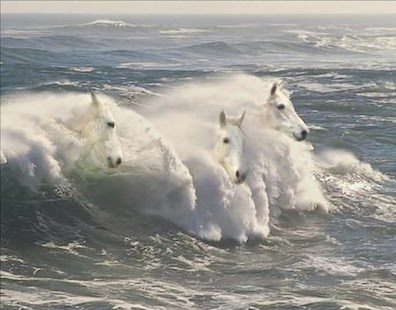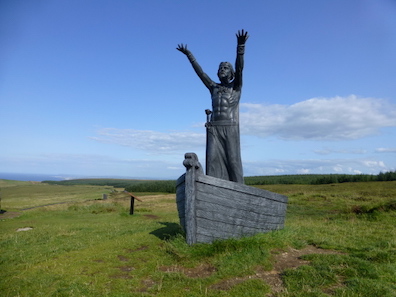In keeping with the Homeric analogue of Proteus, a god changing into animal
shapes on the seashore, Stephen looks out on the ocean
and thinks, "They are coming, waves. The whitemaned seahorses,
champing, brightwindbridled, the steeds of Mananaan." Manannán
Mac Lir is an Irish god of the sea who is sometimes depicted
Poseidon-like driving a horsedrawn chariot (or riding a single
horse named Enbarr) over the waves. Stephen thinks of him
again in Scylla and Charybdis in connection with a
play by George Russell, "A.E."
In Circe Russell and Manannán fuse.
Manannán is strongly associated with the Isle of Man, which
lies northeast of Dublin in the Irish Sea. His Irish name
comes from an old version of Man, and in many stories he
provides protection and good fishing to the Manx people. It
seems possible that Stephen is thinking of this connection as
he looks out to the sea and sees the waves rolling in from the
east.
In Scylla and Charybdis, George Russell's
otherworldly speech triggers Stephen's memory of his play Deirdre:
"Flow over them with your waves and with your
waters, Mananaan, / Mananaan MacLir ..."
Gifford observes that lines like these, chanted by the druid Cathvah in act 3, call
down "a druid curse, the Faed Fia (which Russell
took to mean the last flood, the end of the heroic age), on
the Red Branch Knights just before those heroes begin to
quarrel among themselves and destroy a comradeship-in-arms
comparable to that of the Arthurian Round Table":
Let thy Faed Fia fall,
Mananaun MacLir
Let thy waters rise,
Mananaun MacLir
Let the earth fail
Beneath their feet,
Let thy waves flow over
them,
Mananaun:
Lord of ocean!
In 1902 Russell and William Butler Yeats co-founded the Irish
National Theatre, which produced Deirdre in that year
with Russell playing the part of Cathvah. Circe evokes
this performance when, "In the cone of the searchlight
behind the coalscuttle, ollave, holyeyed, the bearded
figure of Mananaun Maclir broods, chin on knees. He rises
slowly. A cold seawind blows from his druid mouth. About
his head writhe eels and elvers. He is encrusted with
weeds and shells" and speaks "With a voice of
waves." The name of the god is spelled as in Russell's
play and he first appears as Russell does in Scylla:
seated in the shadow of a library lamp, bearded, brooding, an
"ollave, holyeyed." When Russell stands up, he is transformed
into the god and his oceanic character emerges.


